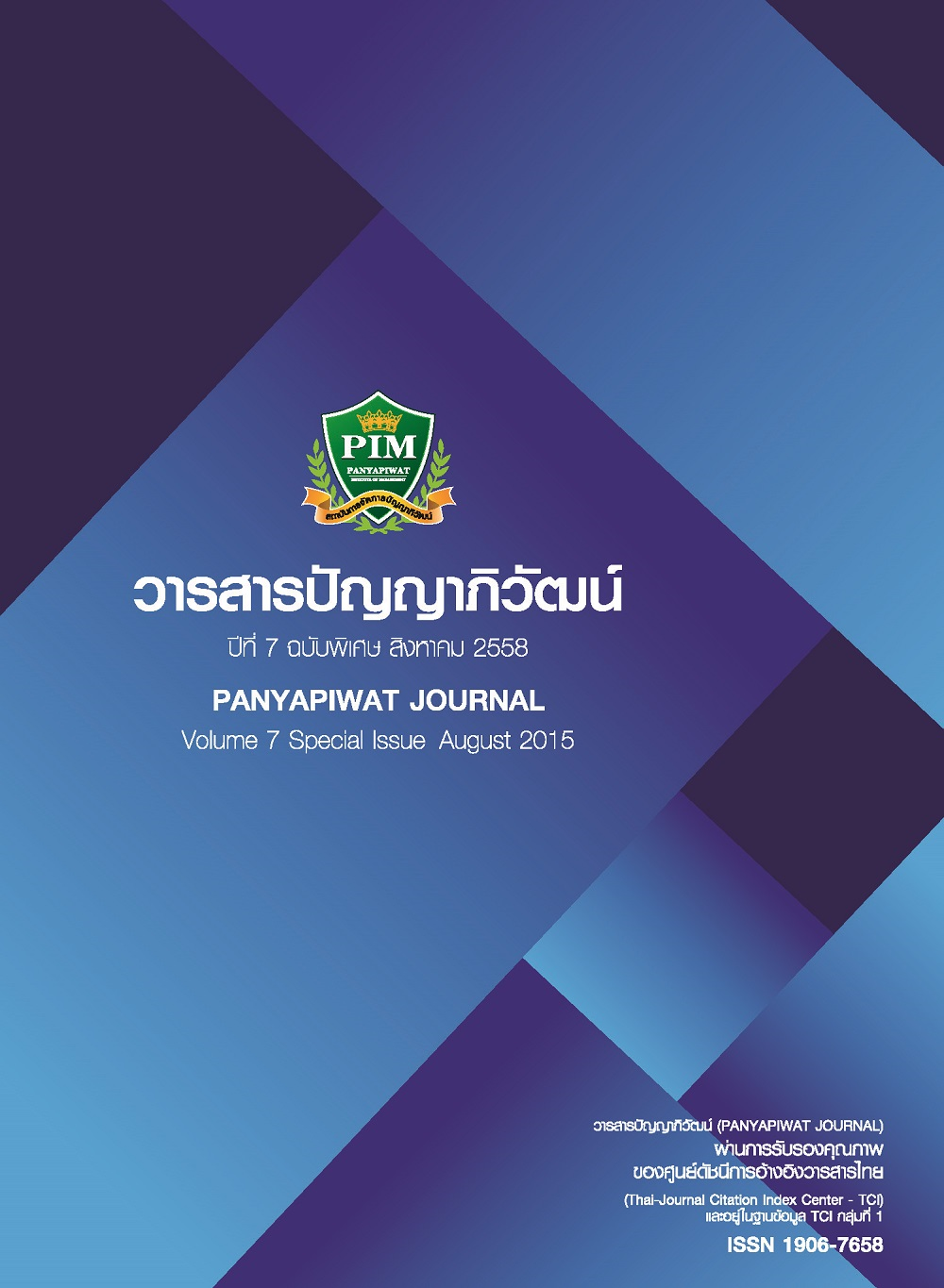ปัจจัยที่มีผลต่อการริเริ่มให้มีการกำกับดูแลเทคโนโลยีสารสนเทศของบริษัทจดทะเบียนไทย
Main Article Content
บทคัดย่อ
การวิจัยครั้งนี้มุ่งหมายที่จะศึกษาปัจจัยที่มีผลต่อการริเริ่มให้บริษัทจดทะเบียนไทยมีการกำกับดูแลเทคโนโลยีสารสนเทศ โดยนำผลการศึกษาที่ได้ไปเป็นแนวทางให้องค์กรอื่นๆ ในประเทศไทยที่ต้องการริเริ่มนำเอาการกำกับดูแลเทคโนโลยีสารสนเทศไปประยุกต์ใช้ในองค์กรของตน ตลอดจนเป็นข้อมูลพื้นฐานสำหรับผู้ที่สนใจด้านนี้ในบริบทของธุรกิจในประเทศไทย กลุ่มตัวอย่างที่ใช้ในการวิจัย ได้แก่ บริษัทที่จดทะเบียนในตลาดหลักทรัพย์แห่งประเทศไทย โดยไม่รวมบริษัทที่อยู่ในระหว่างการฟื้นฟูกิจการ และบริษัทจดทะเบียนในตลาดหลักทรัพย์เอ็มเอไอ จำนวน 160 หน่วยงาน เก็บรวบรวมข้อมูลโดยใช้แบบสอบถาม การวิเคราะห์ข้อมูลทำโดยใช้สถิติเชิงพรรณนาผ่านโปรแกรมสำเร็จรูป และวิเคราะห์เส้นทางความสัมพันธ์เชิงสาเหตุระหว่างตัวแปร และความสอดคล้องของโมเดลความสัมพันธ์เชิงสาเหตุกับข้อมูลเชิงประจักษ์ผ่านโปรแกรมลิสเรล ผลการวิจัยพบว่า โมเดลความสัมพันธ์เชิงสาเหตุของการยอมรับให้มีการริเริ่มกำกับดูแลเทคโนโลยีสารสนเทศของบริษัทจดทะเบียนไทยมีความสอดคล้องกับข้อมูลเชิงประจักษ์ โดยไคสแควร์ (chi-square) เท่ากับ 33.12 องศาอิสระ (df) เท่ากับ 25 ความน่าจะเป็น (p) เท่ากับ .13 ค่าดัชนีวัดความกลมกลืน (GFI) เท่ากับ 0.96 ค่าดัชนีความกลมกลืนที่ปรับแก้แล้ว (AGFI) เท่ากับ 0.92 ค่าดัชนีรากกำลังสองเฉลี่ยของส่วนที่เหลือ (RMR) เท่ากับ 0.04 ค่าดัชนีรากที่สองของความคลาดเคลื่อนในการประมาณ (RMSEA) เท่ากับ .04 โดยตัวแปรที่มีอิทธิพลทางตรงต่อการยอมรับการกำกับดูแลเทคโนโลยีสารสนเทศมากที่สุด คือ ความตั้งใจในการริเริ่มการกำกับดูแลเทคโนโลยีสารสนเทศ ตัวแปรที่มีอิทธิพลทางอ้อมต่อการยอมรับการกำกับดูแลเทคโนโลยีสารสนเทศมากที่สุด คือ อิทธิพลจากสังคม
This research aims to analyze the factor that affect the initiation of Information Technology Governance of Thai listed companies and in order to provide guidelines for other organizations that wish to implement Information Technology Governance and for study this topic in Thai businesses. 160 Thai listed companies were selected (not including the companies listed in MAI and those under rehabilitation) as the samples. Research data were collected by questionnaire and analyzed by descriptive statistics through SPSS program, path analysis method through Lisrel program to test the appropriateness of causal models. The research finding revealed that a causal model of acceptance of corporate IT Governance initiatives from Thai registered companies fit with the empirical data indicating by chi-square =33.12, df = 25, p-value = .13, GFI = .96, AGFI = .92, RMR = .04, and RMSEA = .04. The most influential factor directly affecting the acceptance of Information Technology Governance initiative was the intention to initiate Information Technology Governance while the most influential factor indirectly affecting the Information Technology Governance initiative was the social influence.
Article Details
“ข้าพเจ้าและผู้เขียนร่วม (ถ้ามี) ขอรับรองว่า บทความที่เสนอมานี้ยังไม่เคยได้รับการตีพิมพ์และไม่ได้อยู่ระหว่างกระบวนการพิจารณาลงตีพิมพ์ในวารสารหรือแหล่งเผยแพร่อื่นใด ข้าพเจ้าและผู้เขียนร่วมยอมรับหลักเกณฑ์การพิจารณาต้นฉบับ ทั้งยินยอมให้กองบรรณาธิการมีสิทธิ์พิจารณาและตรวจแก้ต้นฉบับได้ตามที่เห็นสมควร พร้อมนี้ขอมอบลิขสิทธิ์บทความที่ได้รับการตีพิมพ์ให้แก่สถาบันการจัดการปัญญาภิวัฒน์หากมีการฟ้องร้องเรื่องการละเมิดลิขสิทธิ์เกี่ยวกับภาพ กราฟ ข้อความส่วนใดส่วนหนึ่งและ/หรือข้อคิดเห็นที่ปรากฏในบทความข้าพเจ้าและผู้เขียนร่วมยินยอมรับผิดชอบแต่เพียงฝ่ายเดียว”
เอกสารอ้างอิง
กฤษมันต์ วัฒนาณรงค์. (2556, กรกฎาคม 14). การยอมรับ (Adoption) นำมาเป็น “ชุดความเชื่อ” ในสังคมไทย. ไทยรัฐ.
ธงชัย สันติวงษ์. (2546). พฤติกรรมผู้บริโภคทางการตลาด. กรุงเทพฯ: ประชุมช่าง.
Ali, S. & Green, P. (2005). Determinants of Effective IT governance Mechanisms. In proceedings of International IT Governance Conference, Auckland, New Zealand.
Al-tameem, A., Zairi, M. & Kamala, M. A. (2008). “Factors Influencing the Adoption of IT Projects: A ProposedModel” in 2008 IEEE International Symposium on IT in Medicine & Education (ITME 2008).
Bidgoli, H. (2011). Using Information Technologies for Competitive Advantage. Retrieved June 15, 2013, from https://www.csub.edu
Bhattacharjya, J. & Chang, V. (2006). The Evolving IT Governance Practices for IT and Business Alignment – A Case Study in an Australian Institution. In Proceedings of the 4th Annual Conference on Information Science, Technology and Management, Chandigarh, India.
Brisebois, R., Boyd, G. & Shadid, Z. (2011). What is IT Governance? and why is it important for the IS auditor. Retrieved May 20, 2013, from http://www.intosaiitaudit.org/intoit_articles
Chatrudee, J. (2006). Factors that Determine Corporate Governance in Thailand. Unpublished thesis, School of Accounting and Finance/ Faculty of Business and Law Victoria University, Melbourne.
Davis, F. D. (1989). Perceived usefulness, perceived ease of use, and user acceptance of information technology. MIS Quarterly, 13(3), 319-340.
Gartner. (2012). Forecast Analysis: Enterprise IT Spending by Vertical Industry Market, Worldwide, 2010-2016. Retrieved May 1, 2013 from http://www.gartner.com/resId=2230115
Lee, J., Lee, C. & Jeong, K.-Y. (2008). Governance Inhibitors in IT Strategy and Management: An Empirical Study of Korean Enterprises. Global Economic Review, 37(1), 1-22.
McKeachie, W. J. (1997). Helping students to learn how to learn. In Mioduski, S. & Enright, G. (Eds.). PROCEEDINGS OF THE 17TH AND 18TH ANNUAL INSTITUTES FOR LEARNING ASSISTANCE PROFESSIONALS, 53-58.
Nan, Z., Xunhua, G. & Guoqing, C. (2008), “IDT-TAM Integrated Model for IT Adoption”. TSINGHUA SCIENCE AND TECHNOLOGY, 13(3), 306-311.
PwC. (2007). IT Governance in Practice. Insight from Leading CIOs. Retrieved October 2013, from http://www.pwc.com
Rocha Flores, W. & Gevriye, M. (2011). Surveying experts on IT governance factors and their impact on underlying goals. Proceedings of the 8th International Conference on Enterprise Systems, Accounting and Logistics, 10-13 July 2011. Thassos, Greece.
Rokeach, M. (1968). Beliefs, attitudes, and values: A theory of organization and change. San Francisco: Jossey-Bass.
Sylvester, D. (2009). The People Factor in IT Governance. Volume 1. Retrieved May 20, 2013, from https://www.isaca.org/Knowledge-Center/cobit/Documents/COBIT-Focus-Vol-1-2009.pdf
Tavalea, I. (2009). The factors influencing ICT Governance implementation in the organisation: a case study. Master of Computer and Information Sciences, AUT University.
Translated Thai References
Thongchai, S. (2003). Consumer Behavior in Marketing. Bangkok: Prachoomchang. [in Thai]
Wattananarong, K. (2013, July 14). Adoption in Thai society. Thairath. [in Thai]


